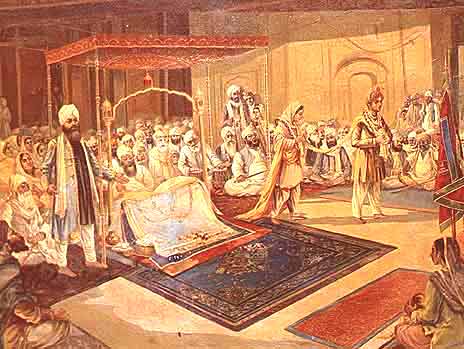

The 'Lavaan' being recited from Guru Granth Sahib during the wedding ceremony.
"lwvW"
Anuvwd
pMjwbI Aqy AMgryzI
"Lavaan"
Translation in Punjabi
and English
Translated by Harjinder Kanwal, Coventry U.K.
gurU
rwmdws swihb cOQI pwqSwhI jI dIAW aucwrn kIqIAW lwvW, ienswn dy dunIAwvI kwrjW
ivcoN iek bhuq hI Aihm Aqy rUhwnI kwrj hY ijsnUM gurU jI ny cwr Av`sQwvW ivc pRIpUrn
hox dw izkr kIqw hY, ijMvy gurbwxI ivc AwauNdw hY, "BeI prwpiq mwnuK dyhurIAw
goibMd imlx kI ieh qyrI brIAw, Avir kwj qyrY ikqY n kwm imlu swD sMgiq Bju kyvl
nwm"[ ieh lwvW ivvwh SwdI nwl sMbMiDq nhIN sn, ienHW dI Awqimk mh``qqw hY,
jo iek jigAwsU nUM Awpxy pRymI Akwl purK nUM imlwaux leI cwr BUimkwvW (lwvW) ivcoN
lMgxw pYNdw hY [ienHW nUM cwr pauVIAW vI AwK skdy hW [ ikauNik ies ivc gurU jI
ny jigAwsU nUM 'Dn', AQvw iesqrI kihky sMboDn kIqw hY Aqy Akwl purK nUM suAwmI
kihky, iesy krky Swied ieh lwvW AnMd kwrjW leI vI iesqymwl hox l`g geIAW, ikauNik
iek iesqRI leI vI ausdw pqI suAwmI ausdw pRmySvr hY [ ies qrWH prmwrQ nwl gurU
jy AwrQk izMdgI dw myl kr idqw [
Guru Ramdas, the fourth Guru
expressed these 'Lavaans' in Soohi raga, which depict the four stages of the pilgrim
towards his goal of reaching the Almighty Lord. According to Gurbani the only
main aim of a person is to seek the realm of God during his mortal stay on this
earth. Guru Ji describes the journey of the devotee pilgrim in four stages. These
stanza were not meant for marriage but because of the way Guru Ji has described
the devotee as the bride and God as the groom, these stanzas have been used for
consummation of marriage. In this way Guru Ji has linked the spiritual and the
materialistic world
sUhI
mhlw 4 ] (773-16)
hir pihlVI lwv privrqI krm idRVwieAw bil rwm jIau ] (773-16,
sUhI, mÚ 4)
hrI (Akwl purK) dI pRwpqI dI pihlI lwv (lgn=lgwE jW BUimkw)
nUM vwihgurU AwpxI ikrpw nwl sMswrk (pRivrqI mwrg) pRwxI nUM idRV (p`kw) krvwauNdw
hY - ijsqoN (pRwxI) Awpxy gurU qoN bilhwr jWdw hY [(ienswn dy duinAwvI jIvn ivc
ivcrn leI, "Avr kwj qyry ikqy nw kwm iml swD sMgq Bj kyvl nwm" hI gurbwxI
duAwrw gurU jI dw aupdyS hY, Aqy ies sMswrk jIvn ivc pRBU imlwp dI pihlI pOVI
ies lwv XW lgn duAwrw gurU jI jigAwsU nUM idRV krvwauNdy hn) [
To
comprehend the awareness of God in a devotee's mundane (worldly) existence, God
initially counsels him resolutely for which (the devotee) affectionately thanks
the Lord.
bwxI bRhmw vydu Drmu idRVhu pwp qjwieAw
bil rwm jIau ] (773-17, sUhI, mÚ 4)
bRhmw jI ny vI AwpxI bwxI vydW ivc
Drm nUM idRV (Drm qy inScw r`Kky) krky pwpW dw nws krnw ikhw hY Aqy gurU pRmySvr
qoN ies krky bilhwr jwxw hY [
(Lord) Brahma in his Vedas has (also) mentioned
that to destroy evil, (the devotee) must adhere resolutely to Dharma - and devotionaly
thank the Lord.
Drmu idRVhu hir nwmu iDAwvhu isimRiq nwmu idRVwieAw ] (773-17,
sUhI, mÚ 4)
Drm nUM p`kw (idRV inscy
nwl) krky mMno Aqy nwm (gurU dw) iDAwvo, ieho hI (sqweI) ismRqIAW idRV (p`kw)
krwauNdIAW hn [
Conform solidly to the doctrines of Dharma and contemplate
on the name of the Guru. This is also confirmed by the 'Simritis' (27 in all -
ancient 'dharama granths')
siqguru guru
pUrw
AwrwDhu siB iklivK pwp gvwieAw ] (773-18, sUhI, mÚ 4)
siqgurU nUM pUrw
gurU (Akwl purK) jwxky ausdI ArwDnw kro ijs nwl swry pwp dUr ho jwxgy [
Consider
the Satguru as the Almighty and contemplate on Him and all your sins will be eradicated.
shj
Anµdu hoAw vfBwgI min hir hir mITw lwieAw ] (773-18, sUhI, mÚ 4)
auh
BwgW vwly hn ijnHW ny Awpxy mn nUM hrI dy nwm nwl im`Tw kIqw hY, aunhW nUM suqy
hI Awqm AnMd pRwpq ho jWdw hY [
They are fortunate who have sweetened
their hearts with the Lords Name, fortuitously they encounter total bliss.
jnu
khY nwnku lwv pihlI AwrMBu kwju rcwieAw ]1] (774-1, sUhI, mÚ 4)
gurU
nwnk (4) kihMdy hn, ik iesqrWH pihlI lgn (lwv) nwl (Awqmw-pRmwqmw dy imlwp dy)
kwrj dI ArMBqw hoeI [
Guru Nanak (the Fourth) says that in this manner
the first step has been taken towards the objective of the union between God and
the devotee.
hir dUjVI lwv
siqguru purKu imlwieAw bil rwm jIau ] (774-2, sUhI, mÚ 4)
Akwl purK
dI ikrpw nwl dUjI lwv (lgn XW BUimkw) nwl siqgurU nwl myl hoieAw - vwihgurU qoN
bilhwr jWdw hW [
With the grace of God, at the second stage, a tryst
with the Satguru has been formed, graciously thanks to the Almighty.
inrBau
BY mnu hoie haumY mYlu gvwieAw bil rwm jIau ] (774-2, sUhI, mÚ 4)
mn
fr qoN rih`q ho igAw Aqy haumY dI mYl nUM gvw igAw- vihgurU qoN bilhwr jWdw hY[
The
mind is completely void of fear and rids the dirt of egoism - gracious thanks
to the Lord.
inrmlu Bau pwieAw hir gux gwieAw hir
vyKY rwmu hdUry ] (774-3, sUhI, mÚ 4)
inrml (sv`C) Bwvnw hox nwl, hrI
dy gux gwien krn nwl Akwl purK nUM Awpxy snmuK vyKdw hY [
With pure
belief, (the devotee) sings praise of the Lord and ultimately sees Him in his
presence.
hir Awqm rwmu pswirAw suAwmI srb rihAw BrpUry
] (774-3, sUhI, mÚ 4)
hr pRwxI dI Awqmw ivc Aqy swry bRihmMf ivc auho
hI PYilAw hoieAw hY [
The Lord is present in all beings and is pervading
the entire cosmos.
AMqir bwhir hir pRBu eyko imil
hir jn mMgl gwey ] (774-4, sUhI, mÚ 4)
AMdr bwhr (pRwxI nUM) bRMhm hI
bRMhm idsdw hY Aqy sMqW BgqW nwl iml ky KuSI dy gIq gwauNdw hY [
(The
devotee) sees the Lord everywhere and joining with the saints and holy people,
sings the songs of joy.
jn nwnk dUjI lwv clweI Anhd
sbd vjwey ]2] (774-5, sUhI, mÚ 4)
gurU jI kihMdy hn ik jIv ny dUjI lgn
(Av`sQw) ivc Anh`d Sbd (ijnHW dI h`d nhIN) (jigAwsU nUM ) suxwey[
In
the second round (step), Nanak says that the devotee hears the mystic melody of
the word.
hir qIjVI lwv min
cwau BieAw bYrwgIAw bil rwm jIau ] (774-5, sUhI, mÚ 4)
qIsrI lwv ivc
(gurU dw) cwE auqpn hoieAw Aqy mn vYrwgI ho ky Awpxy pRBU qoN bilhwr jWdw hY [
In
the third instance, the devotee experiences the joy of longing and graciously
thanks the Lord.
sMq jnw hir mylu hir pwieAw vfBwgIAw
bil rwm jIau ] (774-6, sUhI, mÚ 4)
Akwl purK dI ikrpw nwl mhWpurKW dw
imlwp hoieAw ijnHW ny vfBwgy (jigAwsU ) nUM vwihgurU nwl imlwieAw, ies leI bilhwr
jWdw hY [
With the blessing of the Lord, the fortunate devotee meets
the saints who make it possible for him to meet the Lord; thanks graciously the
Almighty.
inrmlu hir pwieAw hir gux gwieAw muiK bolI
hir bwxI ] (774-7, sUhI, mÚ 4)
inrml (mYl qoN rihq) piv`qR Awqmw pRmwqmw
nUM pRwpq krky, im`TI bwxI duAwrw ausdy guxW nUM gwieAw [
The devotee
attains the Immaculate Lord and sweetly sings His praises.
sMq
jnw vfBwgI pwieAw hir kQIAY AkQ khwxI ] (774-7,
sUhI, mÚ 4)
sMq jnw nwl imlwp krky vfy BwgW vwilAW ny hrI nUM pwieAw
hY Aqy aus Ak`Q hrI dIAW khwxIAW kIqIAW[
The fortunate ones, along after
meeting the saints, have found the Lord and then utter His unutterable praise.
ihrdY hir hir hir Duin aupjI hir jpIAY msqik Bwgu
jIau ] (774-8, sUhI, mÚ 4)
ijnHW ny pRmySvr dw nwm jipAw hY, auhnW dy
ihrdy ivc hir hir nwm dI DMun pYdw ho jWdI hY, pr aus nUM auho hI jp skdw hY ijsdy
Bwg cMgyy hox [
Those who have contemplated on the Lords name, their
being is saturated with the holy name (but) only the fortunate ones are capable
of this devotion.
jnu nwnku boly qIjI lwvY hir aupjY
min bYrwgu jIau ]3] (774-8, sUhI, mÚ 4)
gurU jI kQn krdy hn ik qIsrI
lwv ivc jigAwsU hrI dI pRwpqI dy nwl (ausdw) mn vYrwgI ho jWdw hY [
In
the third step, Guru Ji says, the devotee realises God, and his mind is filled
with yearning for His love.
hir cauQVI lwv min shju
BieAw hir pwieAw bil rwm jIau ] (774-9, sUhI, mÚ 4)
gurU jI cauQI Av`sQw
(lwv) dw izkr krdy dsdy hn ik hrI nUM imlx nwl pRwxI sihj Av`sQw (qurIAw pd) ivc
Aw jWdw hY Aqy (Awpxy gurU qoN) bilhwr jWdw hY [
In the forth instance
(round, step), Guru Ji says that the devotee, after meeting with the Lord, attains
the ultimate divine stage for which he graciously thanks the Almighty.
gurmuiK
imilAw suBwie hir min qin mITw lwieAw bil rwm jIau ] (774-10, sUhI, mÚ
4)
suBwvk gurmuK nUM hrI nwl myl hoieAw Aqy qn mn nUM im`Tw l`gx l`g igAw,
bilhwr jWdw hW [
All too spontaneously the Lord met (the devotee) and
sweetened his mind and body -who graciously thanks the Lord.
hir
mITw lwieAw myry pRB BwieAw Anidnu hir ilv lweI ] (774-10, sUhI, mÚ 4)
ijs
nUM hrI im`Tw lgx l`g jWdw hY ausnUM pRBU cwhux l`g jWdw hY Aqy auh hr GVI (pRmySvr)
ivc ilv (ibrqI) lweI rKdw hY [
Who so ever tastes the sweetness of
the Lord, the Lord (also) starts loving him and he is ever attuned to Him.
mn
icMidAw Plu pwieAw suAwmI hir nwim vjI vwDweI ] (774-11, sUhI, mÚ 4)
mn
ie`Cq Pl dI pRwpqI hoeI Aqy vwihgurU suAwmI dy nwm dI KuSI prgt (vDweI v`jI) hoeI
[
He attains his heart's desires and thanks the Lord God with graceful
acknowledgment.
hir pRiB Twkuir kwju rcwieAw Dn ihrdY
nwim ivgwsI ] (774-12, sUhI, mÚ 4)
ijs vyly siqgurU ny, hrI pRBU jo
swirAW dw Twkur (mwlk) hY, ausdI pRwpqI dw kwrj rcwieAw qW ausdw nwm ihrdy ivc
vsx nwl jigAwsU rUp iesqRI (Dn) AnMd sihq ho geI [
When the Satguru,
brought about this union of God with the bride like devotee, he (she) attains
utter bliss.
jnu nwnku boly cauQI lwvY hir pwieAw
pRBu AivnwsI ]4]2] (774-12, sUhI, mÚ 4)
sRI gurU jI kihMdy hn ik cauQI
lwv (BUimkw) ivc pRBU AibnwSI hrI rUp dI prwpqI ho jWdI hY Bwv inj srUp ivc ABydqw
ho jWdI hY[
Guru Nanak says in the forth round, the devotee (seeker)
attains the Eternal Lord and becomes One.